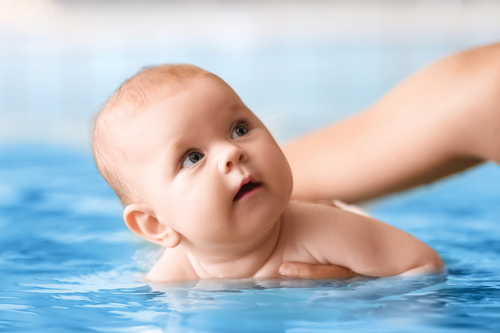
by Susan Lee
new mum and Blue Lagoon regular
Being a first time mum there are so many new experiences as I learn to navigate the journey of parenthood, and baby swimming has definitely been a highlight for me. When I began my baby swimming adventure I had so many questions, so, in the small hours of the morning between feeds, I started my research online and then in person a few weeks later.
Now having experienced classes with my baby, I believe these are the top six questions parents want to ask when it comes to baby swimming, so decided I would share them with you.
When should I start to take my baby swimming?
Babies are allowed to go swimming at any age and do not have to have had their eight week vaccinations before entering a pool. It is, however, recommended that their umbilical cord stump has come off. It is also advised that mums go in the water only after having had their six week postnatal check. For your first time, it’s also great to go with another adult, another pair of hands to help with the bags and someone to help you relax in the water. Whilst we started early, it is never too late to embark on your swimming adventure – although the later you leave it the more likely you will have a delightfully stubborn toddler to contend with!
Do I need to attend classes or can I just take my baby to a swimming pool?
We found classes to be an excellent way to introduce our baby to the water. Not only did we learn some amazing skills, we got to meet other parents and have the reassurance of the teacher’s guidance. We were informed that babies who attend classes are more likely to be super confident in the water at an early age. You don’t however, need to attend structured classes and can simply go to your local swimming pool that offers parent and baby sessions.
Or why not treat yourself to a private swim where you can take your whole family along – we also did this so that our daughter’s grandparents could join in with and enjoy her swimming journey.
I learnt that taking my baby swimming was great for strengthening her heart and lungs, bonding with myself and my partner and creating a positive relationship with water. I found that swimming really helped to regulate her sleep – and boy did she sleep well after her class.
What should I put in my baby’s swim bag?
My big fear of taking our newborn into the water was, what if she has a poo? Having read that normal nappies blow up like balloons and then explode, we packed the suggested swimming nappies and neoprene covering pants which gave us total confidence that no ‘code browns’ would happen in the pool on our watch! We also packed a little swimsuit (because let’s face it they are just so cute), a poncho towel and a roll-up changing mat, although the place we went to did provide them, along with a changing table.
Please also remember to bring your own swimming costume and towel, so unlike my partner who once forgot his, you won’t have to go into the water in your underwear – turns out this is not good swimming pool etiquette! It made me laugh though, at least I can blame things like that on having ‘mummy brain.’ He didn’t have the luxury of that age old (but very real) excuse.
Do I need to be able to swim to attend classes?
Although I consider myself to be an honorary mermaid, in my classes there was a grown-up who was really sacred of the water. In fact, it was their main motivation for taking their little one swimming, helping to ensure that they wouldn’t grow up feeling the same way. Their fear was no issue at all as there is so much support from the staff and other parents and we were never out of our depth or our comfort zone anyway.
How to choose the perfect swim school?
Apparently not all swim schools are required to use trained teachers. So, whilst that may not be seen as essential, I wanted the reassurance that my teacher was a qualified baby instructor. Also important for me was:
• Nearby free parking.
• Good changing facilities – friends of mine have been to classes held in private residential homes and found themselves having to get changed by the side of the pool or in unsuitable facilities.
• A warm shower to wash off the chorine before getting dressed.
• Somewhere to feed after swimming. Again I’d heard horror stories of only having fifteen minutes to change afterwards and having to feed in the car – babies in my experience tend to be very hungry and tired after classes.
Is it important my baby goes underwater?
All of the classes we attended were child-led learning which I loved. If for any reason, our little one didn’t want to go under the water, which was part of the programme, it was never a problem. We were taught that an early underwater experience is a great way to teach our baby all important self-rescue skills. This means, should our daughter find herself falling into water she will kick up and float on her back or turn and return to safety whether that be to me, a noodle, or the side of the pool.
Amazingly, newborn babies have a very strong natural reflex that helps them not to take a breath underwater. Swimming classes use this reflex to give children an underwater experience in a safe and fun way. I have to say however, watching my baby go underwater for the first time really took my breath away. We were delighted to see that she was completely unfazed by submerging, and were encouraged by the instructor to give positive reinforcement, which resulted in big smiles all round.
In summary, we both really love our weekly half hour swimming sessions. We have so much fun together through guided learning and look forward to the coffee and cake in the café with the other mums and babies after the class. I get to feel a real sense of community and know that my baby is getting the best introduction to water play. As a bonus the underwater photographs at the end of our first term were so beautiful – great memories from this very special time in our lives.










